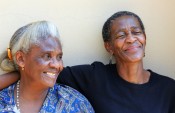Communist ruler Nicolae Ceausescu had a cult of personality; he ordered that his picture be placed all around the country, on walls and posters, and the church was under his systemization. The communist secret police, called the Securitate, watched all priests and pastors closely to make sure that they preached nothing that would rally the people against the government.
Under Ceausescu’s rule, food production and agriculture in Romania slowed; and because the government forced people from their homes and made them live in a systematic way, poverty abounded and people began to starve.
The spiritual starvation was just as rampant as the physical.
At the request of Romanian churches, Ceausescu agreed to allow Billy Graham to come to Romania and speak in seven cities; but he could only speak on church property, which frustrated hundreds of thousands of people who wanted to hear an unadulterated message. They longed for the freedom to practice religion outside of the rule of the state.
Later in 1989, it was the church that revolted and started the Romanian Revolution that overthrew Ceausescu. The Revolution started with a protest in the Piata Victoriei, the plaza outside of the Romanian Orthodox Church in Timisoara where Billy Graham had spoken just four years earlier.
In his autobiography, Just As I Am, Billy Graham writes of his visit to Timisoara:
“Romanian authorities had promised that we would be permitted to place loudspeakers outside all the host churches, and also that we could run television relays to large screens in other churches.
… In each city, however, permission was withdrawn by the authorities. [A teammate] theorized later that the Romanian authorities had simply not believed that people would come to hear the Gospel and had therefore felt free to make promises they wouldn’t have to keep.
But when the crowds did come, the authorities became thoroughly alarmed. Perhaps they feared that if they permitted loudspeakers at one location, even larger crowds would gather at the next.
At one place, I heard, a police officer told a man who was stringing wire to some loudspeakers to take them down.
‘You take them down,’ said the man with a shrug. ‘They’ll kill me if I do it.’
The crowd of thousands, already assembled hours in advance, clearly was not going to allow the speakers to be removed without a struggle.
…We had police escorts everywhere to get us through the crowds. Even so, because of the crush of the crowd, we feared for our lives in Timisoara. There were an estimated 150,000 people that night in front of the cathedral.
Coming out of the packed Orthodox cathedral that evening, we were absolutely mobbed. Many in the crowd were upset because the loudspeakers that they could see outside were dead; apparently, the authorities had cut the wires.
The people forced to stand outside for the entire service, unable to hear anything, wanted me to preach from the cathedral steps. But without amplification, I could not do so; nor would the police have allowed it.
…When we returned to Bucharest at the end of our trip, President Ceausescu, alarmed and surprised by the favorable public reaction, canceled my visit with him; I was received instead by a lesser official.
Ceausescu apparently was afraid that if he received me, some people might think he approved of what had happened. He may also have interpreted the huge crowds as a cloaked demonstration against his regime. In some ways I was sorry; I had been looking forward to sharing my faith in Christ with him.”

